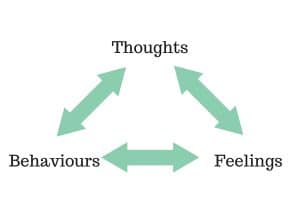Cognitive Behavioural Therapy involves learning how situations impact our thoughts, feelings and behaviours. Often the initial thoughts or automatic thoughts that pop into our mind after something happens are based on our assumptions, beliefs, values and interpretations, not facts, causing us to behave in certain ways. For example, if you have always been told that dogs are scary and will bite you, then every time you see a dog you will automatically jump to the conclusion that the dog will bite (even though it may be the sweetest dog). Thoughts, feelings, and behaviours are inter-connected, so if you change one, it has an effect on the other two.
The best way to understand this is to think about them as a triangle:[/fusion_text][imageframe lightbox=”no” gallery_id=”” lightbox_image=”” style_type=”none” hover_type=”none” bordercolor=”” bordersize=”0px” borderradius=”0″ stylecolor=”” align=”center” link=”” linktarget=”_self” animation_type=”0″ animation_direction=”down” animation_speed=”0.1″ animation_offset=”” hide_on_mobile=”no” class=”” id=””]  [/imageframe][/one_full][fusion_text]
[/imageframe][/one_full][fusion_text]
These thoughts, feelings, and behaviours all interact and influence each other. If you change the way you think and behave, you can also change the way you feel.
[/fusion_text][fusion_text]
How can Cognitive Behavioural Therapy help you?
[/fusion_text][fusion_text]Fertility
Often when struggling with fertility challenges we are faced with negative thoughts about our self-esteem, in addition to the stress related to trying to conceive. An article published by the Independent stated “that CBT can aid fertility by reducing anxiety, which often inhibits ovulation”. With CBT we are able to better cope with our automatic thought processes which can have profound effects on the body and fertility.
Depression (including postpartum depression)
According to StatsCanada, “11% of Canadians aged 15-24 met criteria for depression”, and seeking treatment as early as possible is essential. CBT was originally created for the treatment of depression by tackling the internal dialogue going on in our minds. CBT helps us to figure out the assumptions and core beliefs that we hold on to and feed the negative and unhelpful thinking patterns that fuel symptoms of depression, including symptoms related to postpartum depression.
Stress and Anxiety
When struggling with stress and anxiety, sometimes our minds play tricks on us. We struggle with “what if” or “catastrophizing” thinking that can further amplify our symptoms of anxiety. CBT can help by assisting with analyzing thoughts to determine what’s fact vs. fiction, emotional vs. situational, or real vs. imagined. Often anxiety leads us to believe that our thoughts are real, but CBT helps us to learn to balance our thinking which can help us to better cope with stressful situations and life’s transitions.
If interested in Cognitive Behavioural Therapy (CBT) book an appointment with our resident therapist. Psychotherapy and Counselling services are available at Bronte Wellness Boutique.[/fusion_text]


